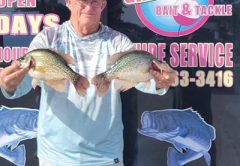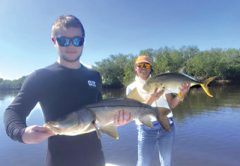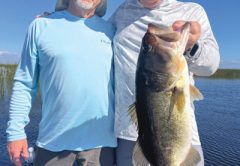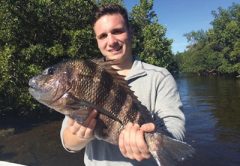These days not a day goes by without some news, good or bad, about the use of unmanned aerial vehicles a.k.a UAVs. Whether the topic is about privacy rights, safety, or national security, conversations can quickly develop into heated arguments over the pros and cons of the use of these aircraft.
For outdoorsmen, the same arguments ring true except in our case, whether the use of UAVs for hunting and fishing is unsportsmanlike or not.
First let’s set the record straight, radio controlled unmanned aerial vehicles (RC-UAV) are not ‘drones’. Marketing Executives and media outlets may think referring to a RC UAV as a drone may make them sound cooler or more menacing but the fact is, RC UAVs are not autonomous flight capable machines that can fly for hours at a time and launch Hellfire missiles. They have limited range, capacity, and require a remote pilot at all times.
WITH ALL THIS TECHNOLOGY AT YOUR DISPOSAL THE USE OF A RC UAV IN THE OUTDOORS IS LIMITLESS. FOR HUNTING, RC UAVS CAN BE USED TO SPOT FOOD PLOTS, LOCATE ACTIVE TRAILS, AND TRACK WILDLIFE.
Another fact is that RC UAVs are here to stay. As technology advances the range, speed, utility, and price points of future RC UAVs will only improve. Today an entry level RC UAV will cost under $ 500.00, have a flight time of 15 minutes, a range of 2,000 feet, and a payload capacity of less than one pound. For those with deeper pockets, you can find units customized to your needs which can extend your range, speed, or payload capacity. The one common trait among all electric RC UAVs is that their capabilities are directly linked to the limitations of lithium ion battery technology. As battery performance increases so too will the capabilities of RC UAVs. When operating a RC UAV, you’ll find flight duration is a balance between weight, speed, and environmental conditions as you can only squeeze so much juice from a single battery pack. With all this technology at your disposal the use of a RC UAV in the outdoors is limitless. For hunting, RC UAVs can be used to spot food plots, locate active trails, and track wildlife. For those of you that may think using this technology is unsporting then all one has to do is look back at the history of hunting. For once upon a time, the use of an automatic shotgun, or a tree stand, or trail-cam were once considered unsporting. The issue is not the ‘use’ of technology but rather, how and for what purpose technology is used. Yet despite the clear benefits, many states are pushing forward with regulations banning the use of RC UAVs to hunt wild game. In the vast majority of states, hunting is a management tool used to cull out unhealthy animals and to control herd populations. By limiting the tools available to hunters is reducing the effectiveness of wildlife management. Fortunately for us in the State of Florida, the State Legislature and the FWC have yet to restrict the use of RC UAVs for hunting so long as they are used in a proper manor and not violate existing regulations and privacy concerns. For example you cannot use a RC UAV to herd quarry into your field of fire nor can you fly your RC UAV into restricted airspace for the purpose of scouting wild game.
The use of RC UAVs for fishing activities though similar, do present a different set of issues due to the nature of commercial operations, professional tournaments, recreational activities and the cost of operations.
For many of us, the cost of operating a RC UAV may limit its use within the marine environment. RC UAVs are mechanical objects that are influenced by the operator and the environment. If you’re out scouting a sounder (family) of feral hogs and you have a mechanical breakdown you may crash your unit but more than likely you’ll be able to recover and repair it. If you’re on the ocean scanning weed lines for signs of bait and you have a mechanical issue, your unit is probably going to drop into the ocean and you can kiss your $ 1,000 unit goodbye. This might be an acceptable loss for commercial operations but for the average fishermen, it would be a deal breaker.
Many professional tournaments have been proactive in addressing the use of RC UAVs. Both the FLW and B.A.S.S. have modified their rules of conduct to incorporate RC UAVs into the non-fly over periods during pre-tournament practice sessions and the tournament itself. In Rule 5 of the FLW guidelines it states “Flights over tournament waters, including drones, are not permitted beginning with the start of the off-limits period, extending through practice and competition days.” Since the vast majority of local tournaments incorporate the rules and guidelines of these two associations into their guidelines, one can expect to see similar restrictions at the local level.
As for the recreational fishermen, for those who like their toys, RC UAVs can be an interesting tool to add to one’s tackle box. A RC UAV can be used to scout out new areas before firing up that big motor or you could use it to transport your bait with pin point accuracy. With a wireless camera you’d be able to spot bedding bass or other spawning fish from afar in real time. In large lakes and on the ocean a RC UAV would be an ideal tool to have when scanning the surface for active schools of bait and weed lines. Granted for most of us this would detract from the peace and tranquility we seek when fishing but for those who embrace new technologies, this would provide a unique playground to explore.
Finally there is the real concern of governmental agencies using this technology to monitor our activities both on the water and in the woods. Though agencies such as the US Coast Guard are using military UAVs, a.k.a. drones, for drug interdiction and nation security surveillance, don’t be surprised if someday these same devices are used to record illegal fishing or hunting activities. Perhaps they already are!
For most outdoorsmen, getting away from it all is the main reason why we enjoy the great outdoors. Now with the introduction of RC UAVs, just when we think we’re far from the maddening crowds, hiking the back trails, airboating in the Everglades, casting quietly in a remote stream, or trolling deep offshore, we might not be alone after all.







